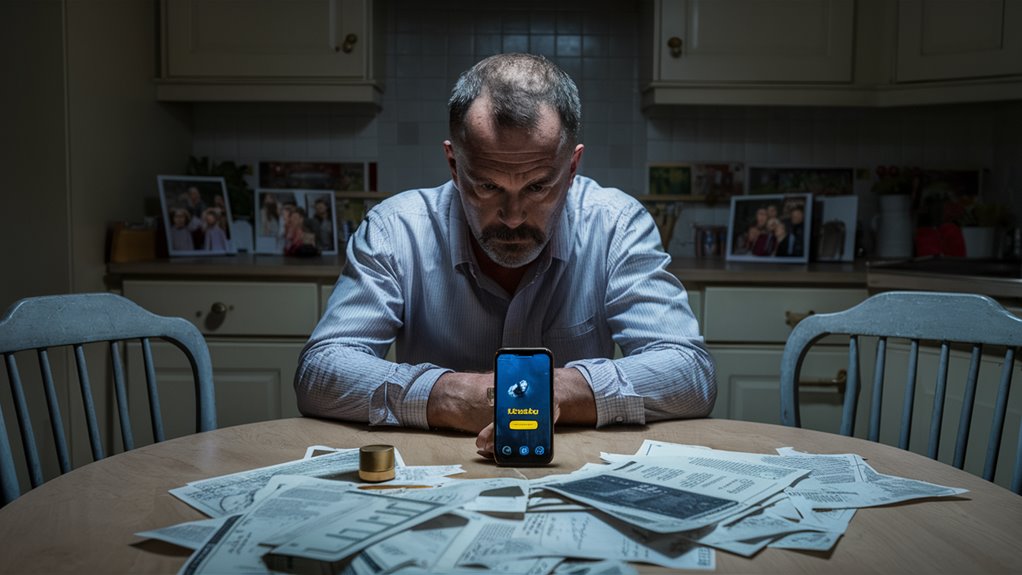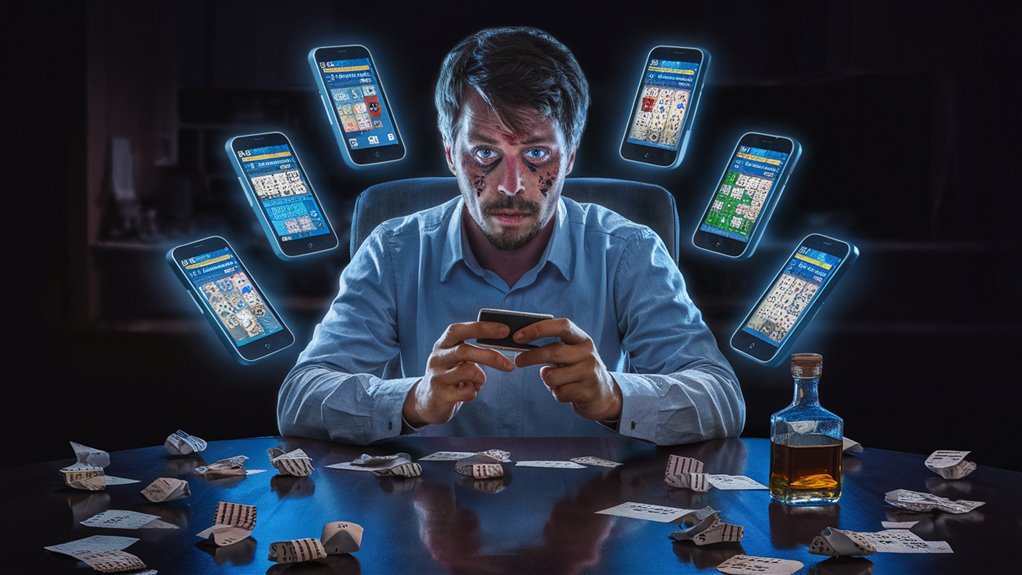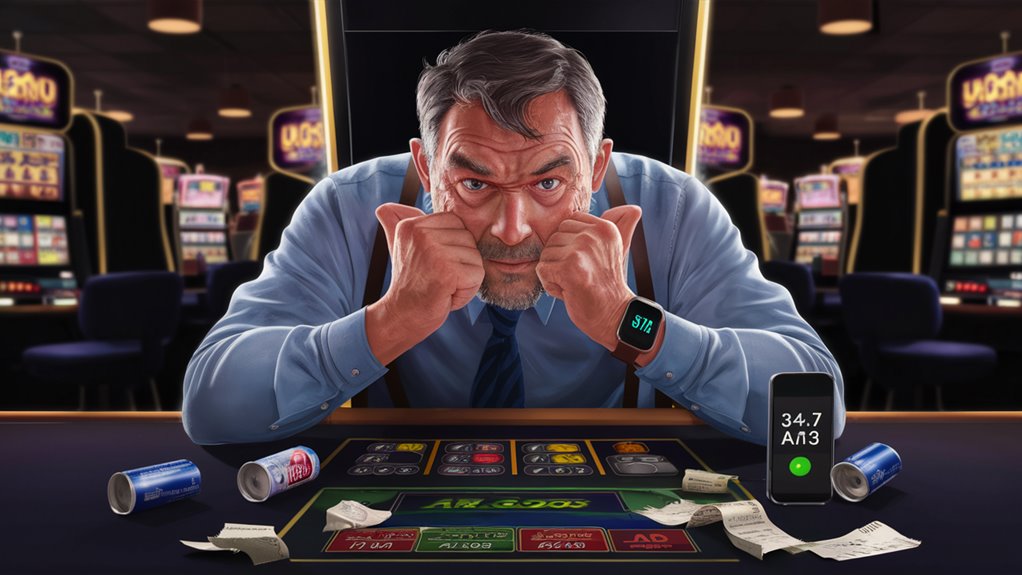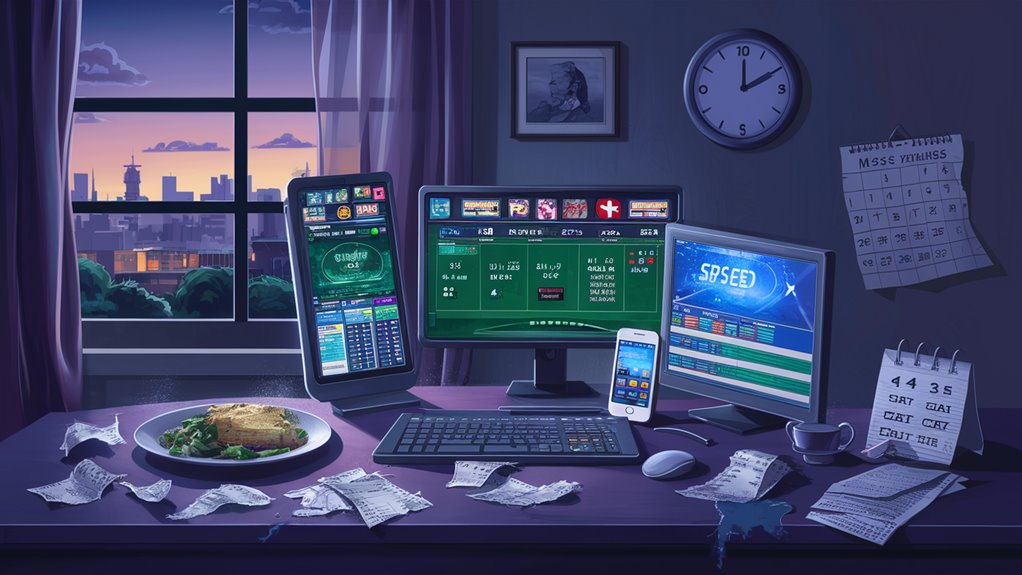You know how easy it’s become to place a bet these days? With smartphones and websites offering gambling at our fingertips, it’s trickier than ever to spot when casual betting starts turning into something more serious. Think about it: what starts as a friendly poker night or a quick sports bet can slowly transform into a pattern that’s tough to break.
Well, here’s the thing about gambling – it’s kind of like that old saying about boiling a frog. The changes happen so gradually that you might not notice until things have gotten pretty intense. Maybe you started with small bets on weekend games, but now you’re checking odds during work meetings. Or perhaps you’ve noticed a friend who always seems to need “just one more bet” to break even.
Let’s get real for a minute. Nobody wakes up one morning and decides to develop a gambling problem. It sneaks up on you, bit by bit. Sometimes it starts after a big win, when the thrill of that victory keeps pulling you back for more. Other times, it might begin as a way to blow off steam after a rough day.
What makes this whole situation even trickier is how normal gambling has become in our society. Between fantasy sports leagues, lottery apps, and online poker rooms, betting opportunities are everywhere you look. That’s why it’s super important to know the difference between having some fun and heading down a risky path.
I think we all need to be honest with ourselves about our habits. Because catching these warning signs early on isn’t just about protecting your wallet – it’s about protecting your whole life from taking an unexpected turn. Stick with me, and we’ll walk through the signs that might show when casual betting is becoming something more serious.
Financial Warning Signals

Let’s talk about those financial warning signs that might suggest someone’s dealing with a gambling problem. You know how money troubles can sneak up on you? Well, there are three big red flags we should keep an eye out for.
First up is what’s happening with your savings account. If you find yourself dipping into those hard-earned savings more often than you’d like to admit, especially right after payday, something’s probably not right.
It’s like having a bucket with a hole in it – no matter how much you put in, it keeps draining away.
Then there’s the whole credit card situation. We’ve all had tight months, but when you’re constantly bumping up against your credit limits or taking cash advances, that’s different.
Maybe you’ve noticed yourself applying for new cards just to cover gambling losses? It’s a slippery slope that can turn into an avalanche of debt before you know it.
The third sign hits closer to home – literally. When you start asking friends and family for loans more frequently, it might be time to pause and reflect.
Does this sound familiar? Making up stories about why you need money, or hiding bank statements from your loved ones? These behaviors often point to a deeper issue with gambling.
Here’s something most people don’t think about: those gambling transactions leave a digital trail. Your bank and credit card companies can see exactly where that money’s going.
Changes in Personal Relationships

Let’s talk about how gambling can really shake up someone’s personal relationships. You know how you can usually tell something’s off with a friend? Well, it’s pretty clear when gambling starts taking over their life.
Think about that friend who used to never miss a family barbecue but now always has an excuse ready. They start pulling away from the people closest to them, skipping birthday parties, and being super mysterious about where they’re going all the time. It’s like they’re slowly fading from the picture.
The way they talk to people changes too. They might get really defensive if you ask innocent questions about their weekend plans, or snap at you for bringing up money. And those little white lies? They start piling up. “Oh, I was working late” becomes their go-to explanation when really, they were at the casino again.
It’s especially tough to watch how this affects their kids. Picture a young daughter scanning the bleachers for her parent during her big soccer game, but they’re nowhere to be found. Or the countless times they’ve promised to make it to dinner but send a quick text with another excuse instead.
The money situation gets awkward fast. They might start asking to “borrow” cash from friends and family, promising to pay it back soon. But somehow, that payback never happens.
Even their work life takes a hit – suddenly they’re calling in sick more often, or you notice they’re just not quite there mentally during meetings.
If any of this sounds familiar, whether it’s someone you know or maybe even yourself, it’s worth paying attention to. When gambling starts pushing away the people who matter most, that’s usually a sign that things have gone too far.
Mental and Emotional Red Flags

Let’s talk about those mental and emotional warning signs that might pop up when gambling becomes a concern. You know how our minds can sometimes send us signals that something’s not quite right? Well, it’s exactly like that with problem gambling.
Think about those moments when you’re trying to focus on work, but your mind keeps drifting to thoughts about your next bet. Or maybe you’ve noticed yourself feeling unusually anxious whenever you can’t place a wager. These aren’t just random feelings, they’re actually important signs to pay attention to.
Have you caught yourself spending more and more time planning your bets or replaying past gambling experiences in your head? It’s kind of like when you can’t stop thinking about that TV show you’re binge-watching, except this preoccupation can have serious consequences.
And if you’re starting to hide your gambling habits from friends and family, well, that’s definitely something to think about.
What’s really concerning is when gambling becomes your go-to solution for feeling better. Maybe you’re having a rough day at work, feeling lonely, or just stressed out, and you find yourself turning to gambling to lift your mood.
Or perhaps you’ve noticed you get irritable or restless when trying to cut back, almost like your morning coffee withdrawal, but potentially more serious.
The tricky part is when feelings of guilt and shame start creeping in after gambling sessions, but you still find yourself going back for more.
If things have gotten to the point where you’re having dark thoughts or feeling hopeless about your situation, it’s really important to reach out for help right away. Remember, these feelings aren’t something you have to handle on your own.
Behavioral Changes While Gambling

Let’s talk about how gambling behavior can change over time – it’s something that sneaks up on you if you’re not careful. You know how it starts, right? Maybe you notice yourself needing bigger bets to get that same rush of excitement, or feeling unusually irritated when you can’t play.
Think about those times when you’ve said “just five more minutes” but ended up staying for hours. It’s like watching one more episode of your favorite show, except this habit can seriously impact your wallet. And speaking of money, there’s that tempting thought of “I’ll win it back next time” that keeps pulling you back to the tables or slots.
Here’s what to look out for: Are you suddenly borrowing money or dipping into your rent fund to place bets? Maybe you’ve caught yourself making up stories about where you’ve been, or skipping dinner with friends because you’d rather try your luck at the casino.
Your gambling style might change too – taking bigger risks, ignoring your budget, or betting amounts that make your stomach twist with anxiety. The really tricky part? Some people develop these little rituals, like wearing their lucky socks or insisting on playing at the same machine.
And when someone brings up your gambling, do you find yourself getting defensive or changing the subject? Or perhaps you’re carefully deleting your browser history and hiding betting slips in places no one would think to look.
It’s kind of like a slow drift – at first, you barely notice you’re moving away from shore, but before you know it, you’re in deep water. Recognizing these changes early on can make all the difference in staying in control of your gambling habits.
Time Management Warning Signs

Let’s talk about how time slips away when gambling starts taking over. You know that feeling when you check your watch and can’t believe how many hours have passed? What started as a quick betting session somehow turns into an all-day affair, and before you know it, you’re hooked on gambling websites or can’t tear yourself away from those casino games.
Pretty soon, you might find yourself showing up late to work or completely forgetting about important meetings. Your sleep schedule? Well, that goes out the window when you’re up until 3 AM placing bets or lying in bed thinking about your next gambling session. Food becomes an afterthought, and suddenly you’re wolfing down meals or skipping them altogether just to get back to gambling.
But here’s where it gets really concerning. Remember those weekend barbecues with friends or your kid’s soccer games? When you start choosing gambling over these moments that used to bring you joy, that’s a serious warning sign.
Maybe you’ve caught yourself using vacation days not for actual vacations but for gambling sprees. Or perhaps you’ve called in sick to work, not because you’re under the weather, but because you can’t resist placing more bets.
When gambling starts running your schedule and controlling your daily choices, it’s time to pause and get help. Trust me, these warning signs shouldn’t be ignored, and there’s no shame in reaching out for support before things spiral further.
Common Questions
Can Gambling Addiction Be Inherited Genetically From Parents to Children?
Ever wondered if gambling problems run in families? Well, it turns out there’s more to it than just learned behavior. Scientists have discovered that our genes play a surprisingly big role in whether we might develop gambling issues later in life.
Think about it like this: just as you might inherit your mom’s eye color or your dad’s height, you can also inherit certain traits that make you more vulnerable to gambling addiction. Research tells us that about half to 60% of your chances of developing gambling problems come straight from your DNA.
But here’s the thing – having these genes doesn’t mean you’re destined to become addicted to gambling. It’s more like having a predisposition, kind of like how some people are more likely to gain weight if they don’t watch their diet. Your environment, personal choices, and lifestyle still play huge roles in whether these genetic factors actually lead to gambling problems.
What Medications Are Commonly Prescribed to Help Treat Gambling Addiction?
When it comes to treating gambling addiction, doctors have several medication options in their toolkit. You’ll typically find that antidepressants, particularly SSRIs, play a key role in treatment, helping to manage the underlying emotional aspects that often fuel gambling behavior. Many patients also benefit from mood stabilizers or anti-anxiety medications, which can help keep those overwhelming urges in check.
But here’s something interesting: medications like naltrexone and nalmefene, which were originally developed for alcohol and opioid dependence, have shown real promise in helping people control their gambling urges. Think of these medications as a brake pedal – they help slow down those intense cravings that can make gambling so hard to resist.
How Long Does Gambling Addiction Recovery Typically Take With Professional Help?
Let’s talk about gambling addiction recovery, because the timeline isn’t exactly one-size-fits-all. You might be wondering how long it’ll take to get back on your feet, and honestly, it varies from person to person.
Most professional treatment programs run somewhere between 3 to 6 months, but that’s just the beginning of the journey. Think of it like learning to play an instrument – you start with the basics, but mastering it takes time and practice.
The real work happens in the months and years that follow. With regular counseling sessions and support group meetings, most people need about 1 to 2 years to develop solid, lasting changes in their behavior. During this time, you’ll learn new coping strategies, rebuild relationships, and gradually rewire those gambling impulses.
Just remember, recovery isn’t a race. Some folks might need more time, while others might progress faster. What matters most is sticking with the process and building a strong support system along the way. Professional help gives you the tools, but using them effectively in your daily life takes time and patience.
Are Certain Types of Gambling Games More Addictive Than Others?
You know how some games just grab your attention more than others? Well, when it comes to gambling, certain types really do pack more of an addictive punch. Let’s take slot machines, for instance – they’re like the potato chips of the gambling world, it’s hard to stop at just one pull. The bright lights, exciting sounds, and quick-fire results keep players coming back for more. Online gambling can be just as tricky, sitting right there at your fingertips 24/7, making it way too easy to place “just one more bet.” And those casino table games? The social buzz, the thrill of the cards turning, and the constant action create a perfect storm of excitement that can be tough to walk away from. It’s fascinating how these games are designed to keep us playing, with their rapid rewards and non-stop action making them particularly challenging to resist.
What Percentage of Recovered Gambling Addicts Experience a Relapse?
Let’s talk honestly about gambling addiction recovery and relapse rates. The reality is that somewhere between 60% to 75% of people who’ve overcome gambling addiction will face at least one relapse along their recovery journey. But don’t let these numbers discourage you – they’re just part of the story.
Think of recovery like learning to ride a bike. Most of us fell a few times before getting the hang of it, right? The same goes for breaking free from gambling addiction. What really makes a difference is having the right support system in place. Regular counseling sessions and connecting with others in support groups can dramatically reduce your chances of relapsing.
You know what’s interesting? Many people who do experience a setback actually come back stronger, having learned valuable lessons about their triggers and coping mechanisms. The key isn’t just about avoiding gambling – it’s about building a whole new lifestyle and support network that makes recovery more sustainable in the long run.